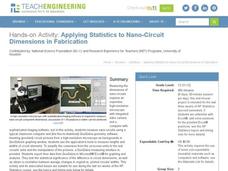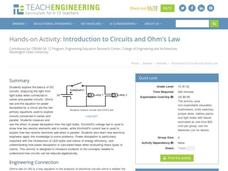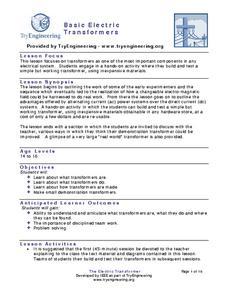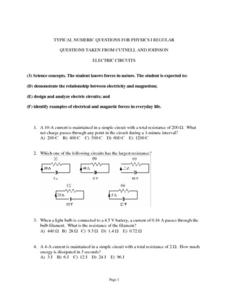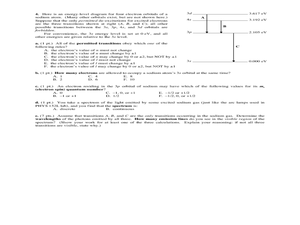CK-12 Foundation
Resistor Simulation
Many scholars struggle to picture electrons traveling in a circuit but understand water going through a pipe. The simulation compares circuits to water pipes. It walks pupils through four levels of questions, allowing them to switch...
CK-12 Foundation
Capacitor Simulation
The camera flash works based on a simple circuit, but why does it require a capacitor? Scholars work through two levels of simulations related to circuits and capacitors. The pupils first use a simple circuit with a battery, resistor,...
CK-12 Foundation
Electric Analogies
We can see the result of electricity but not the process itself. The simulation compares electric circuits to a water tower and water wheel cycle. Young scientists adjust the height of the tower, the amount of resistance, and if the...
CK-12 Foundation
Power Lines
How does electricity travel through power lines? The simulation demonstrates the how changes in voltage and resistance are related to the distance between power polls and the thickness of the cable. Scholars control three variables in...
CK-12 Foundation
Flashing Neon Light
How does a neon light work and does it actually contain the gas neon? An enlightening simulation encourages pupils to play with circuits and neon lights. They control the capacitance, resistance, and color of the bulb, and the simulation...
CK-12 Foundation
Flashlight
In a simple circuit, does electricity start instantly? A simulation encourages thinking about the flow of electrons at a microscopic level. Pupils control the voltage, resistance, and switch in order to observe the change in both ideal...
Columbus City Schools
It’s Electric!
Shocking! Who knew so many great ideas existed for teaching middle schoolers about electricity? Find them all within this energetic framework. You'll light up at the variety of printable and web-based resources within! After building...
LABScI
Circuits Lab: Lightbulbs
Electrons flow from negative to positive, but the general consensus is that current flows from positive to negative. Scholars explore current through construction of circuits in both series and parallel. The focus is on voltage,...
Bowels Physics
Electric Circuits
Investigate the construction of the electric circuit with a thorough presentation that provides a solid background for each type of circuit. After introducing key vocabulary, the lesson goes on to explain circuit design.
Teach Engineering
Applying Statistics to Nano-Circuit Dimensions in Fabrication
Do flexible circuits change dimensions during fabrication? Groups use GeoGebra software to measure the length of pictures of flexible nano-circuits. To determine if the circuits change dimensions, future engineers use Microsoft Excel to...
PHET
Capacitor Lab
The first capacitor was a Leyden jar, invented in 1745. Physics scholars explore capacitors in an engaging simulation. They may view one or set up circuits which contain two to three either in series or parallel. Other views include...
Exploratorium
Penny Battery
Use pennies to light an LED. Class members follow the provided directions to build a multi-celled battery powered by pennies. Using stacks of pennies of varying heights, pupils control the voltage of the battery to light different colors...
Teach Engineering
Can You Resist This?
Some things are hard to resist. Small collaborative groups build circuits and calculate the voltage using Ohm's Law. Budding engineers explore the connection between the voltage across different resistors and linear functions with...
Teach Engineering
Introduction to Circuits and Ohm's Law
Take a very basic understanding of circuits and develop a strong understanding of the parts and function of a circuit. This activity is developed to be an independent exploration of circuits from the basics to series and parallel models....
Institute of Electrical and Electronics Engineers
Basic Electric Transformers
Life as we know it would not be possible without electric transformers, so there are fewer more pertinent topics for your eager young engineers. An astounding amount of background information is provided to help you develop a lecture on...
Curated OER
On the Right Circuit
After a discussion on how to make a light bulb light up in an electrical circuit, young scientists take a look at four circuits, and they choose the one they think will make the lightbulb light up. Use in conjunction with any initial...
Curated OER
Can You See the Light?
Third and fourth graders use this worksheet to help them draw their own version of a fully functioning circuit. They see the battery, the light bulb, and two wires with clips. They must draw the complete circuit, using these elements, on...
Curated OER
Are These Made of Metal?
How can you tell if something is made of metal? Use a table of data and a science experiment to determine which items are made of metal. The experiment requires adult supervision, as it instructs third graders to build an electrical...
Curated OER
Typical Numeric Questions for Physics I - Electric Circuits
A collection of 15 practice problems, most of them involving circuit schematics, is provided for your physics class on this handout. Learners are to compute the net charge, resistance, energy, or power dissipated for different...
Curated OER
Energy
Wow! Colorful and simple, these 160 slides introduce the various forms of energy, along with a relevant image. Some of the images are animations, which help beginning physical scientists to visualize the flow of electrons or energy! This...
Curated OER
Physics 152 Fall 2004 Final Exam, Parts A, B, C, D
At the end of a general physics course focused on light and electricity, you can administer this exam. Concepts covered include electromagnetism, circuits, induction, light rays, lenses and mirrors, characteristics of light, electron...
Curated OER
Circuit Math
Seven circuits are spread over three pages. One is a parallel circuit, one is a series circuit, and the rest are combinations. Emergent electrical engineers solve for current, voltage, or resistance. They fill in a chart for each...
Curated OER
Solar Kit Lesson #11 - Power Maximum: An Electrical Determination
Collaborative groups connect resistors and solar panels in series and measure electrical resistance, voltage, and current. The objective is to order 16 solar panels from strongest to weakest. They graph current-voltage and power curves...
Curated OER
DC Branch Current Analysis
Engage your class in physics with this series of questions. The first question is the most hands-on and asks learners to build their own circuit. The rest of the questions are related to current analysis. Class members solve 7 problems...











